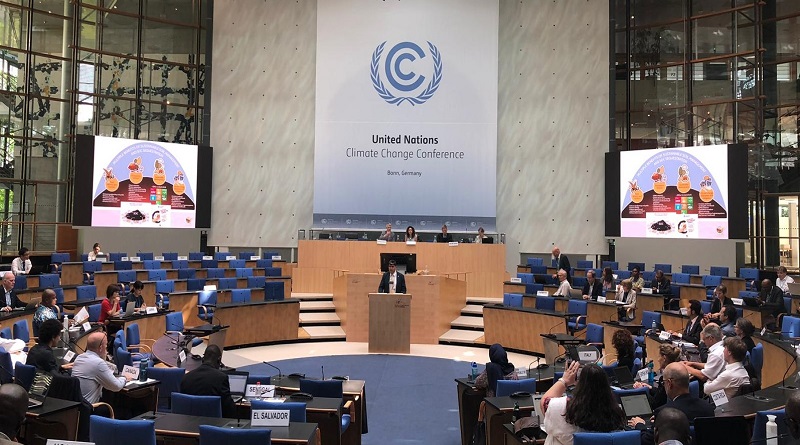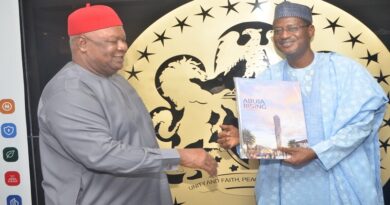Campaigners react to Bonn Climate Conference
The 10-day ‘agenda fight’ at the UNFCCC Bonn climate talks brought to the fore the glaring lack of finance that is essential for climate progress.
Decades of mistrust on the delivery of finance, for instance with the $100bn still unfulfilled, forced open a conversation on the need for actual money on the table for poorer countries to implement their climate action plans to phase out fossil fuels and make a just and equitable transition towards renewables and address adaptation and loss and damage.
To keep the world on track to limit warming below 1.5ºC we need rapid far-reaching greenhouse gas emission cuts and the finance to do this in a just and sustainable way.
COP28 in Dubai must be the moment to signal the end of the fossil fuel era and ensure countries commit to a plan for fair, fast and funded phase out from fossil fuels alongside commitments to scale up renewable energy and energy efficiency.
Harjeet Singh, Head of Global Political Strategy, Climate Action Network International: “The Bonn Climate Conference laid bare the glaring hypocrisy of wealthy nations, showcasing a remarkable indifference to the struggles of developing countries. Let’s be clear: without honouring their financial pledges—directly tied to their historical role in driving the climate crisis—these affluent nations lack the moral authority to exert pressure on poorer countries. Developing nations face the monumental task of eradicating poverty, fostering green development, and coping with escalating climate disasters. They deserve unwavering support, not undue pressure.”
Fernanda de Carvalho, WWF Global Climate and Energy Policy Lead: “We came to Bonn to prepare for a COP that delivers on all fronts: phasing out fossil fuels while phasing in renewables; strengthening adaptation and loss and damage and support to the most vulnerable; and a strong stocktake that keeps a 1.5˚C future within reach. Instead, what we saw here was disappointing: process issues delaying action and a lack of trust between countries. This doesn’t match the urgency and the need for rapid and deep cuts in emissions highlighted by science. We must get on track for COP28 to contribute to closing the ambition, adaptation and finance gap. The scale of political will needed from world leaders is as enormous as the global climate crisis. The world can’t afford to waste any more time.”
Teresa Anderson, ActionAid International’s Global Lead on Climate Justice says: “UN climate talks this week exposed a gaping hole in the funding needed to pay for climate action. Developing countries are being pushed deeper into debt by the costs of climate disasters, but the promised funding to cope with climate impacts and scale up green technologies still hasn’t appeared. Meanwhile, rich countries are trying to artificially inflate the numbers with loans and carbon markets, which are likely to do more harm than good to communities on the ground. It’s not surprising that developing countries are reluctant to negotiate further commitments if they suspect they won’t get the funding to deliver them. After all these years of broken promises, developing countries no longer want to take that leap of faith.
“All eyes are looking ahead to COP28 climate talks, in the hope of finalising a new fund to address loss and damage. The same crunchy questions around cash will need to be resolved if climate talks are to have a chance of really helping people on the front lines of the crisis.
“Unless the upcoming Summit for a New Global Financing Pact in Paris next week leads to unconditional debt cancellation and scaled up grant-based finance then it is unlikely to deliver the breakthrough that is so urgently needed.
Andreas Sieber, Associate Director of Global Policy, 350.org :“COP28 President and oil CEO Al Jaber says at the UN climate talks that fossil fuel reduction is unavoidable. it’s time for action, talk alone is cheap. Al Jaber must step up by presenting a solid plan and selecting a pair of ministers to facilitate and elevate discussion on energy transition. COP28 cannot conclude without committing to a complete and equitable fossil fuel phase-out and setting ambitious renewable energy targets.”
Sébastien Duyck, Senior Attorney; Campaign Manager Human Rights & Climate, Center for International Environmental Law: “The UN climate talks are going in the wrong direction, and we do not have time to waste. It is hard to imagine Sultan Al Jaber advancing an agenda for a full, fair, funded, and equitable fossil fuel phaseout and respect for human rights at COP. UAE’s history of repression and surveillance creates justified fear for climate advocates planning to attend COP28. We must reset the table. For climate policies to deliver just and effective action, the voices of those most impacted by climate harms and the fossil economy must be at the negotiating table, and we must end corporate capture of policy making at these negotiations.”
Susann Scherbarth, Head of Climate Justice, Friends of the Earth Germany (BUND e.V.):”The path towards the global climate conference in Dubai this November remains uncharted. Instead of taking responsibility for curbing the climate crisis and providing trillions to support the poor and vulnerable, wealthy nations such as the United States and the European Union have pointed fingers at poorer nations for impeding progress. As a result, the upcoming climate negotiations in Dubai find themselves engulfed in a big sandstorm of uncertainty.
But it’s crystal clear what needs to come out of the world climate conference in November: a fast, fair and funded phase out of all fossil fuels and secured substantial financial commitments in trillions from wealthy nations. These funds are crucial to empower and support the poor and vulnerable in effectively tackling the climate crisis in a way that leaves no one behind. Wealthy nations like Germany need to end their shopping sprees around the world, where they fill their bags with gas and colonial patterns.”
Alex Rafalowicz, Executive Director of the Fossil Fuel Non-Proliferation Treaty: “We are in the midst of a climate crisis happening here and now. Some governments are taking this seriously like Fiji which publicly called for a fossil fuel treaty. The COP presidency, UAE, notably shifted and said that the phase down of fossil fuels is inevitable. So the question for these negotiations is how we are going to make that transition happen faster and fairer. The signs coming out of Bonn are concerning. During the climate talks, the United States and other countries that are some of the biggest producers of fossil fuels actively blocked proposals for full consideration of the just transition issue. If we can’t talk about just transition and how we work together, we are not going to accelerate that transition to meet the deadline that we have. For that reason people across the world have declared that they are going to fight back and fight for the end of fossil fuels, fast, fair and forever.”
Jazmín Rocco Predassi, Climate Policy Coordinator, Fundación Ambiente y Recursos Naturales (FARN): “SB58 was supposed to deliver the first steps of the new Sharm el-Sheikh joint work on implementation of climate action on agriculture and food security, including a roadmap and future workshop topics. Instead, it provided a glimpse of the difficulties to address this complex sector in the climate negotiations that we have seen over the past few years, as it was only able to come up with procedural conclusions. It is yet to be seen how much this four-year joint work can provide for concrete solutions to the climate and food crises, and whether trust can be rebuilt among Parties and Observers at COP28.”




